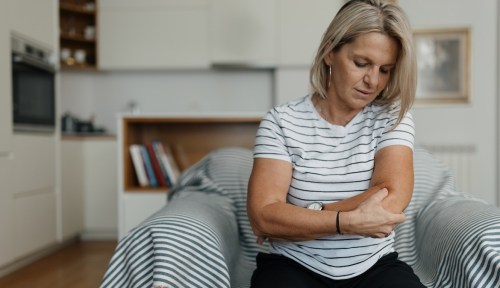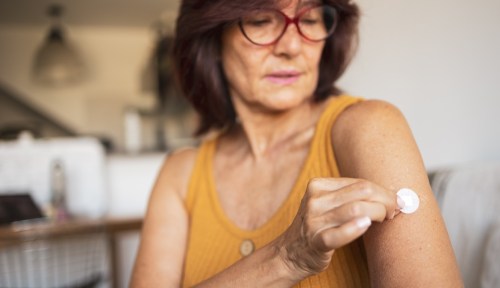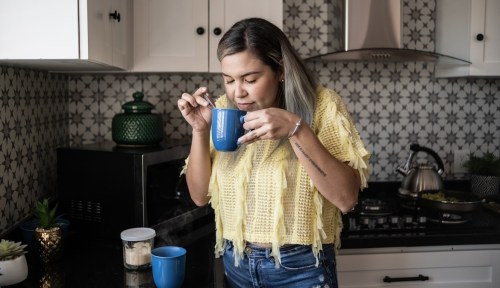Among the things no one tells you about menopause is the fact that it can affect your joints. That’s right: The phase that’s typically characterized by things like hot flashes, vaginal dryness, and mood swings can also cause surprising menopause symptoms—like creakiness and soreness in your knees, hips, and elbows. And turns out, it’s far more prevalent than you think.
Experts in This Article
menopause-focused nurse practitioner with Forum Health.
“It’s common for perimenopausal and postmenopausal women to get musculoskeletal pain, which can manifest as joint pain, muscle stiffness, or general aches,” says Traci Eliszewski, NP, a menopause-focused nurse practitioner with Forum Health. In fact, a November 2020 meta-analysis of 16 studies on menopause and joint pain in Neural Plasticity1 found that nearly three-quarters of perimenopausal women say they regularly have musculoskeletal pain.
In other words, this is no menopause myth. If you’re going through menopause with joint pain, here’s a closer look at why it happens, other contributing factors, and ways to soothe the soreness.
What causes menopause joint pain?
Menopause joint pain can be chalked up to many factors. While aches, pains, and stiffness that strike or worsen during menopause are sometimes related to your actual hormone changes, other things can also be at play.
Hormone changes
Fluctuations in the hormone estrogen can affect how your joints feel. “Estrogen plays a role in maintaining joint health and lubrication, so its decline can contribute to stiffness and discomfort,” Eliszewski says.
Hormonal shifts can have an indirect effect, too. They can cause sleep disruptions (hello, hot flashes) and up the risk for feelings of anxiety and depression, all of which are associated with worse joint pain, the Neural Plasticity review concluded.
Weight gain
Extra weight can put more pressure on your joints, which may up the risk for aches or stiffness regardless of menopause, per the American Academy of Orthopaedic Surgeons. But the risk for added pounds can go up during menopause, because it’s tied to “a shift in body composition, with a decrease in lean muscle mass and an increase in fat mass,” says Eliszewski.
Keep in mind: Not everyone going through menopause will gain weight, and not everyone needs to lose weight, either. Talk with your health-care providers about what is right for you.
Aging
Your joints have started to rack up more age-related wear and tear by the time menopause rolls around, which can translate to more pain and soreness starting as early as your mid 40s, says the Cleveland Clinic.
Joint conditions
Musculoskeletal conditions become more common as we get older. Some (like arthritis) aren’t always related to menopause, though some research suggests that menopause-related hormone changes may increase inflammation that raises the risk for rheumatoid arthritis, the Arthritis Foundation notes.
“Hormonal changes during menopause can also contribute to conditions like osteoporosis or osteoarthritis, further exacerbating musculoskeletal discomfort,” Eliszewski says.
“Hormonal changes during menopause can also contribute to conditions like osteoporosis or osteoarthritis, further exacerbating musculoskeletal discomfort.”—Traci Eliszewski, NP
What does menopause joint pain feel like?
Joint pain that happens during menopause feels similar to joint pain that might happen for other reasons. “Patients often describe this pain as a dull, persistent ache in the joints or muscles, stiffness, or soreness that can affect mobility and daily activities,” says Eliszewski.
Does joint pain happen during a specific time in menopause?
Different people have more menopause-related joint pain at different times. “Some women may experience an increase in musculoskeletal symptoms during the early stages of perimenopause when hormonal fluctuations are most significant,” Eliszewski explains. “As estrogen levels decline more sharply around the time of menopause, typically in the late perimenopausal and early postmenopausal stages, some women may notice an exacerbation of musculoskeletal pain.”
How long menopause symptoms last in general will often vary from person to person, too. The average is about seven years, but can last up to 14 years, per the National Institute on Aging.
How to treat menopause joint pain
Healthy lifestyle habits are often at the core of easing joint pain during menopause, but there are also other options you can consider. This may include:
- Getting active every day: This may sound counterintuitive, but moving more can actually help you feel better, Eliszewski notes. The Centers for Disease Control recommends sticking with low-impact activities like walking, swimming, or bicycling, because they’re less taxing on achy joints. Other good exercises for menopause joint pain include Pilates or weight training.
- Using warm or cold compresses: Heat is more effective for menopausal arthritis relief and stiffness, because it boosts circulation and flexibility. Ice, on the other hand, might be a better choice for joint pain caused by an injury, the Cleveland Clinic. For example: If you get menopause hip pain at night, you can try using a heating pad in bed.
- Taking pain relievers as needed: Over-the-counter options like acetaminophen, ibuprofen, or naproxen can be a good choice for curbing occasional pain. You can also try applying a pain-relieving ointment like capsaicin directly to your stiff spot, suggests the Cleveland Clinic.
- Considering physical therapy: If you’re dealing with persistent pain or stiffness, especially pain caused by arthritis, physical therapy can teach you stretching and strengthening exercises to relieve your symptoms and make it easier to do more of your day-to-day activities, according to the Arthritis Foundation.
- Asking your doctor about hormone replacement therapy: Taking estrogen “can help alleviate symptoms of hormone imbalance” that can happen as your hormones shift during menopause, Eliszewski says. Supplemental estrogen may also help other menopause symptoms like hot flashes and mood swings. Just keep in mind: If you have a uterus, make sure you’re also taking progesterone (or a combination pill), as estrogen on its own can increase your risk of things like endometrial cancer, per the National Cancer Institute. You can weigh the pros and cons of hormone replacement therapy (HRT) with your doctor.
- Maintaining a healthy weight for your body shape and size: If you and your doctor have determined you have overweight that’s affecting your joints, losing weight in a healthy manner can reduce pain and improve joint function, according to the Arthritis Foundation. This can help take pressure off of your joints. (Of course, talk to your doctor before starting any sort of weight-loss regimen, to see if it’s right for you.)
Preventing joint pain in menopause
Once you’ve got your joint pain under control, there’s more you can do to reduce the chances of flare ups and keep your joints healthy in general. Try to:
- Pay attention to your posture: Sitting and standing up straight can help reduce strain on your muscles and joints, Eliszewski says. So, too, can using proper lifting techniques when you’re picking up something heavy, like a big bag of groceries or a grandkid. “Bend at the knees, keep your back straight, and lift with your legs rather than your back,” she adds.
- Eat more anti-inflammatory foods: Eating patterns rich in fruits and vegetables, whole grains, healthy fats, lean protein, seafood, and beans are tied to lower rates of inflammation, including inflammation in your joints, per Harvard Health Publishing. Some good snacks for joint pain to try? Go for a handful of walnuts, chia seed pudding, or a packet of tuna.
- Consider taking joint supplements: Some research suggests options like glucosamine and chondroitin, fish oil, S-adenosyl-methionine (SAM-e), curcumin, and vitamins K and D have been shown to support joint health and reduce pain and stiffness, the Arthritis Foundation says. Other beneficial vitamins and minerals for adults over 50 include calcium, vitamin B12, and vitamin E.
When to see a doctor
If at-home remedies aren’t doing enough to manage your menopause joint pain and stiffness, or if your discomfort is making it harder to do everyday activities, let your doctor know. They can ask about your symptoms, examine your joints, and help figure out what’s driving the problem, so you can decide about the best treatment option.
FAQ
Will joint pain from menopause go away?
This depends on the person. “Some women may experience a reduction in musculoskeletal pain post-menopause, while others may find that their symptoms persist or even worsen,” Eliszewski says. While discomfort driven by hormonal fluctuations will likely ease up after menopause, factors like aging, changing in body composition, or the development of new musculoskeletal conditions can still contribute to pain, she adds.
Ultimately, it’s possible to get postmenopausal joint stiffness and pain.
What is the best natural remedy for menopause joint pain?
There’s no one “magic bullet” of natural remedies for menopause joint pain. That said, healthy lifestyle habits like exercise, physical therapy, eating a balanced diet, and even taking natural supplements for menopause joint pain can add up to lessen discomfort.
What supplements help menopause joint pain?
Research suggests there may be some helpful supplements for menopause joint pain. This includes glucosamine and chondroitin, fish oil, S-adenosyl-methionine (SAM-e), curcumin, and vitamins K and D. All have been shown to support joint health and reduce pain and stiffness, the Arthritis Foundation notes. Your doctor can help you decide which joint supplement is right for you.
—reviewed by Andrea Braden, MD, OB/GYN
Lu CB, Liu PF, Zhou YS, Meng FC, Qiao TY, Yang XJ, Li XY, Xue Q, Xu H, Liu Y, Han Y, Zhang Y. Musculoskeletal Pain during the Menopausal Transition: A Systematic Review and Meta-Analysis. Neural Plast. 2020 Nov 25;2020:8842110. doi: 10.1155/2020/8842110. PMID: 33299396; PMCID: PMC7710408.
↩︎
Sign Up for Our Daily Newsletter
Get all the latest in wellness, trends, food, fitness, beauty, and more delivered right to your inbox.
Got it, you've been added to our email list.










